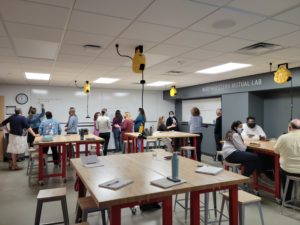 We kicked off our 6th season of Collab Labs on last week with a return to in-person sessions, this year at MSOE’s We Energies STEM Center. The session provided an opportunity to share a bit more about the water projects developed by our Learn Deep Fellows and hear from them how things are progressing as they implement those projects with their students. The first project focuses on student interviews about what “clean water” means to individuals work on water related issues, systems, technology, or infrastructure. To support that work our discussion focused on interviews — what we want students to get out of them, and what both students and interviewees need to make that a productive experience.
We kicked off our 6th season of Collab Labs on last week with a return to in-person sessions, this year at MSOE’s We Energies STEM Center. The session provided an opportunity to share a bit more about the water projects developed by our Learn Deep Fellows and hear from them how things are progressing as they implement those projects with their students. The first project focuses on student interviews about what “clean water” means to individuals work on water related issues, systems, technology, or infrastructure. To support that work our discussion focused on interviews — what we want students to get out of them, and what both students and interviewees need to make that a productive experience.
What do we want students to get out of interviews?
Our discussion started with the question “What we want students to get out of interviews with adults in the community?” Across the four discussion groups several key themes emerged:
- Develop interview skills and techniques
- Learn how to be an effective listener
- Practice, research, prepare
- Create appropriate questions and be able to ask follow up questions based on the conversation
- Record responses, building conversation
- Interview skills (asking questions, recording responses, building conversation, etc.)
- Research skills (asking questions, citing sources, etc.)
- Understand something more about the person they are interviewing & where they are coming from
- We want them to be inspired by our stories
- Exposure to different life stories & histories
- Recognition that learning is ongoing
- Exposure to different careers
- They will become knowledgeable about various career paths
- How their current learning experience connects to life after K-12
- They can discover the relevance of the topic to their lives
- Understand something more about the topic at hand
- Understand the cultural significance of water
- Real life integration & connection
- Learn about different careers (involving water in this case)
- Students gain knowledge about water, climate change, global warming and how they are interconnected
- Students will understand the value of freshwater and civic responsibility
- Students will learn 21st century skills
- Students will gain knowledge about water politics, exercise their citizenship and take action
Cutting across all of these ideas is a goal articulated by one of the groups– the chance to expose students to what they might not know, whether that is career opportunities, uses of water, or the path that an interviewee took to the interesting work they do today.
What do students need?
Our discussion groups found broad agreement on what students need to make effective use of interviews
- Preparation
- Know who they are interviewing
- Context – who am I interviewing
- Research the interviewee/topic of discussion
- Background knowledge of the interview subject/their work/expertise
- Time to think about and prepare questions in advance
- Comfort and awareness of space
- Practice
- Low stakes practice opportunities
- How to ask authentic questions
- How to listen with intent
- Restating/clarifying
- With the technology they will use to conduct the interview
- Propriety
- Communication skills
- Drafting interview questions
- How to check for understanding
- Scaffold
- Clarify both ways
- Feedback for both practice and live interview sessions
- Peers
- Interview subjects (perhaps via follow-up survey)
- Interview opportunities that work for students/interviewees — e.g. in person, or virtual
What do interviewees need?
The key concern heard across groups is that interviewees recognize who they are speaking with:
- Understand the age of the kids (their level of knowledge and how to talk with them)
- Understand the purpose of the interviews
- Learning goals/needs of students
Other needs include:
- Be prepared to ask the students questions
- What they should include (their story/path)
- Advance knowledge of questions that will be asked during the interview
- The opportunity for interviewees to ask follow up questions/provide their feedback.

